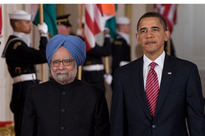 At the 50th anniversary celebration in Silicon Valley of India's IIT- the India Institute of Technology - Harvard dropout and then Microsoft CEO Bill Gates departed from his usual avoidance of college speech-ifying to give a rousing tribute and endorsement to this great Indian institution.
At the 50th anniversary celebration in Silicon Valley of India's IIT- the India Institute of Technology - Harvard dropout and then Microsoft CEO Bill Gates departed from his usual avoidance of college speech-ifying to give a rousing tribute and endorsement to this great Indian institution.
Over the years, hundreds of IIT alumni, Gates has often noted, contributed mightily to Microsoft's success, providing untold numbers of programmers and computer scientists to development programs within Microsoft.
Referring to the IIT as, "an incredible institution that has really changed the world and has the potential to do even more in the years ahead," Gates noted: "I don't speak at many college events. There's more opportunity than there is time.
"But when I thought about it and I thought about the great things that people from IIT have done at Microsoft, the role that I think IIT can play inside India in tapping into its potential I decided I'd make a very special exception," Gates observed.
That was in 2003. In the intervening years, India has made even further strides in computer and technology development, helping not Just Microsoft, but a long, long list of MNCs who have tapped into India's huge, talented pool of engineers, scientists and computer programmers.
IIT alumni have created a formidable reputation for excellence and leadership in cutting-edge technologies in the U.S., and are now permeating to Europe and other Asian countries.
Recent investments in India by Microsoft ($400 million), Cisco ($200 million), and Intel ($100 million) are considered endorsement of the confidence that IITians and Indian professionals have generated in MNCs. A large numbers of IIT alumni have made significant contributions to their alma mater.
But for all its accolades, and great strides in tech development, India still has a long way to go to - especially when it comes to native, grown-at-home technology developments and innovation.
This week, as part of a state visit by India to Washington, D.C. and president Obama, India and the U.S. have signed a series of cooperative agreements designed to give a boost to India's innovation profile. Obama welcomed the country's prime minister, Manmohan Singh , to the White House as first state visitor of his administration
The agreements, signed by India's Federation of Indian Chambers of Commerce and Industry (FICCI) were contained in a series of MoUs that spell out cooperation with three leading US institutions.
Signed during the prime minister's visit this week, the first MoU was with IC2 Institute at the University of Texas at Austin and calls for the implementation of new, distinctive programs in India with the aim of helping Indian innovators bring their ideas to the world.
According to published reports, the sponsorship from the Lockheed Martin Corporation, FICCI and IC2 Institute teamed together in March 2007 to launch a first of its kind initiative - "The India Innovation Growth Program" with the prime objective of assisting Indian innovators across the country and across a diversified range of sectors to take their R&D work to global markets.
The program, sources indicate, has successfully completed three years and has signed 73 business deals in India and around the world. Major deals have been signed under the program in the sectors of waste management, rural technology, life sciences, avionics and green technology.
FICCI and IC2 Institute have also jointly assessed 200 technologies from 26 Defense Research and Development Organization (DRDO) laboratories across India and seven licensing agreements have been finalized in India according to reports.
The second MoU with the Polytechnic Institute of New York University commits the organizations to a culture of innovation in India. Under this pact, NYU-Poly and FICCI will design and host activities to promote an understanding of how partnerships between government, industry, and educational institutions can spur advances in research and bolster economic activity in India.
The two organizations have agreed to bring their respective strengths to meet India's growing demand for world-class research and development facilities that attract global talent.
NYU-Poly, New York City's most comprehensive engineering and technology institutions of higher education, will showcase the successes of American models of private-public partnerships at events in India. FICCI in turn will engage academic, research, government, and business entities in the cultivation of public-private partnerships.
FICCI and NYU-Poly will also look at ways Indian academic, research, and business practices could be adopted in the US, making them more cost effective.
The third MoU with the Institute of International Education, Inc. (IIE) outlines an agreement to partner to promote and facilitate educational and training exchanges between the United States and India.
IIE, a leading not-for-profit educational and cultural exchange organization in the United States, will collaborate with FICCI to facilitate more student exchanges and build academic partnerships between the two countries.
The organizations will also work together to build the capacity of Indian higher education institutions to attract U.S. study abroad students to their campuses, and will build awareness of study abroad opportunities currently available in India for U.S. students, according to the memorandum.
The two organizations will promote educational partnerships through cooperation in activities such as FICCI's Higher Education Summit, the activities and services of the IIENetwork membership association of higher education institutions, and joint seminars for building awareness among Indian institutions regarding scholarship programmes that will help in enhancing faculty and research scholar cross mobility between the two countries.
Leave a comment